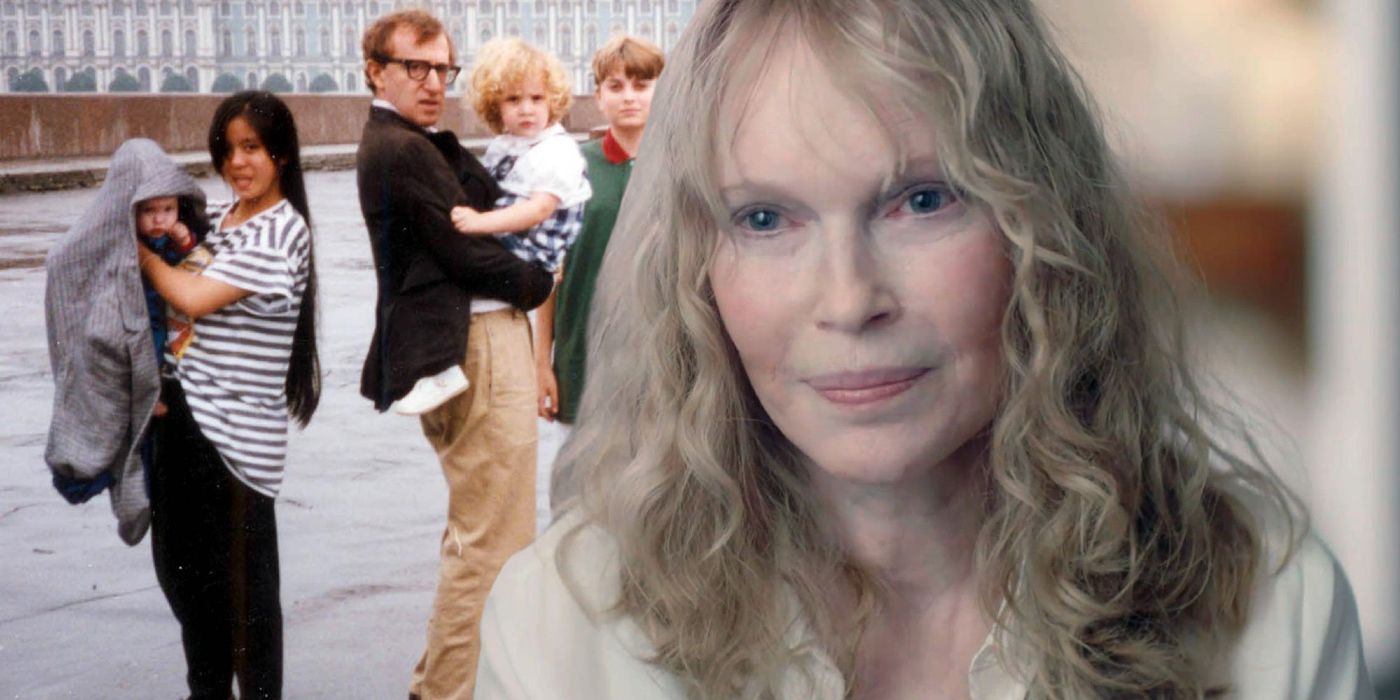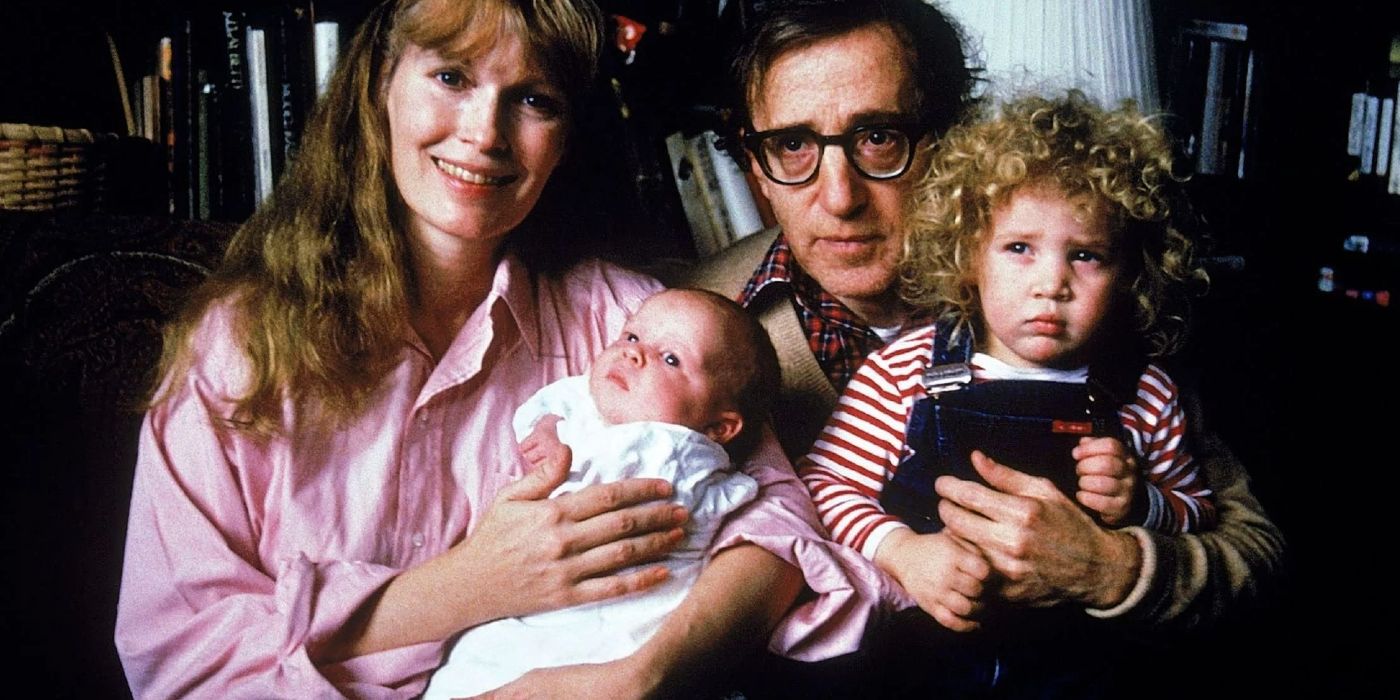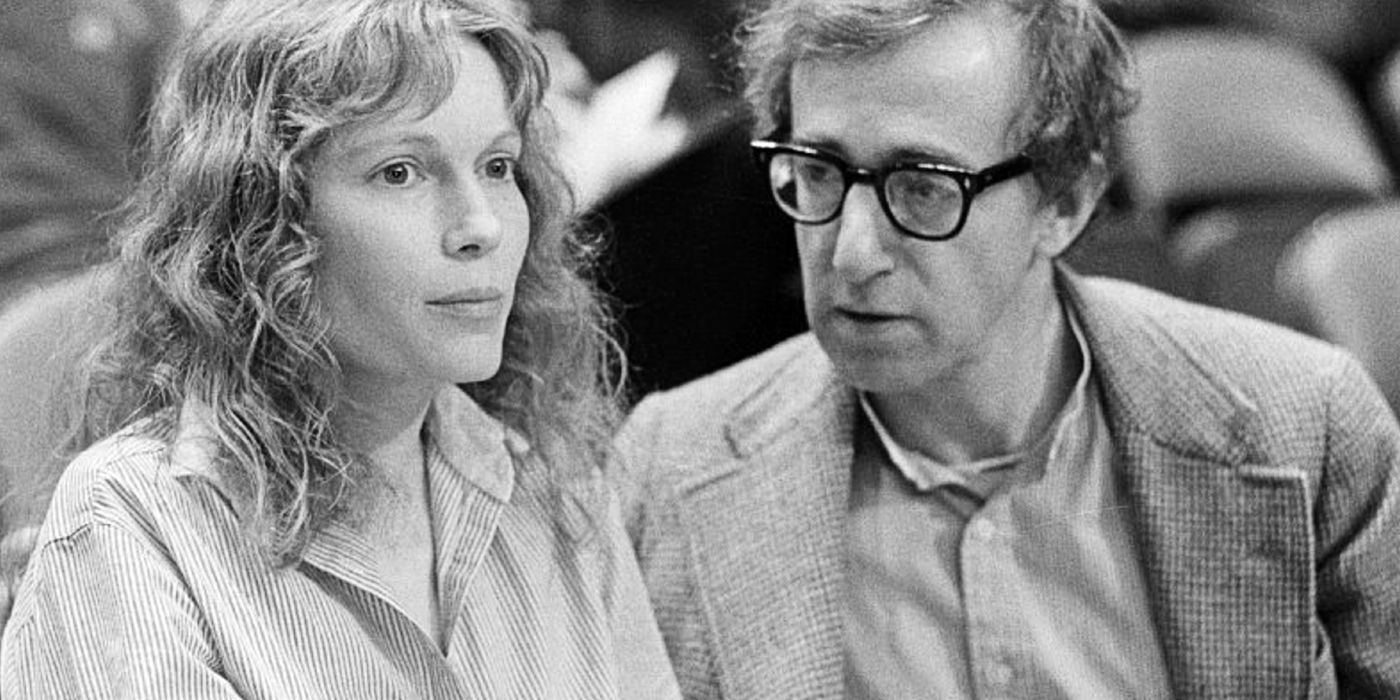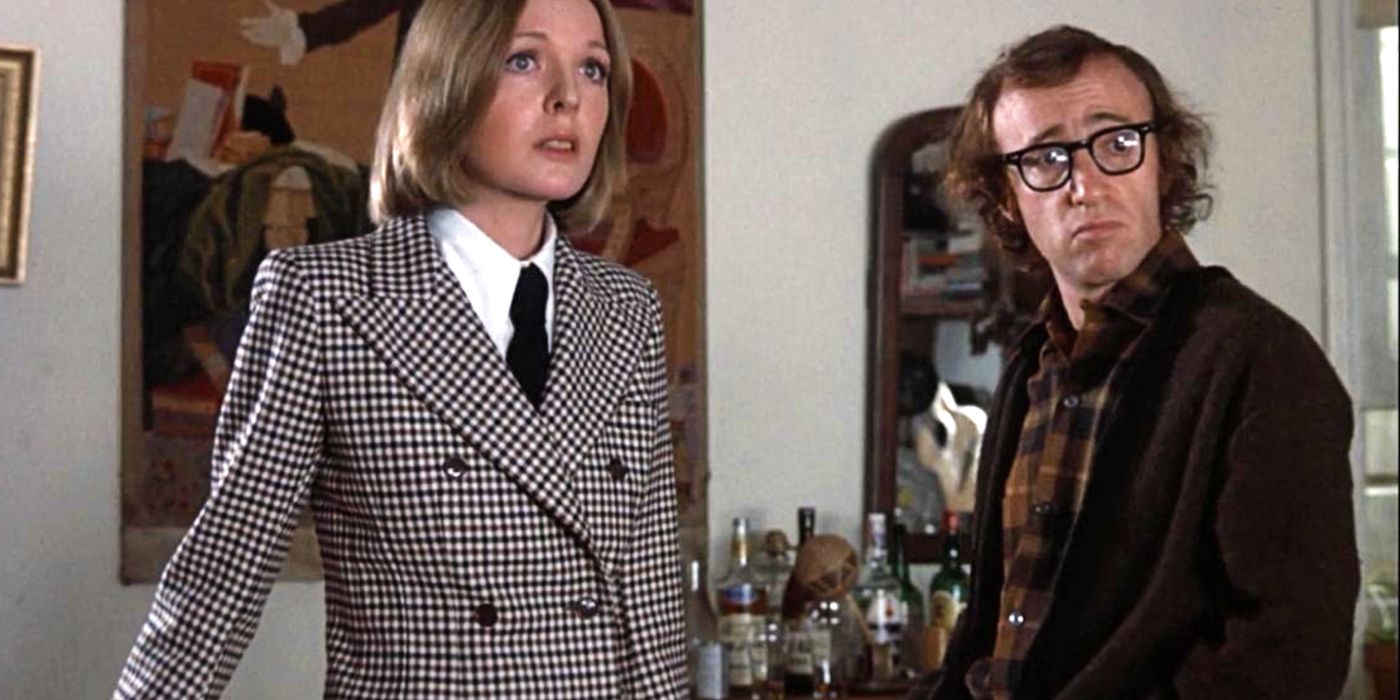HBO’s four-part documentary series, Allen v. Farrow, confronts decades of latent injustice and exploitation by chronicling the details of sexual abuse allegations by Dylan Farrow against her father, Woody Allen. Directed by award-winning investigative filmmakers Kirby Dick and Amy Ziering, Allen v. Farrow talks about the harrowing circumstances that embroiled a then 7-year old Dylan, which included a custody trial and the controversial aftermath of Allen’s relationship with Mia Farrow’s daughter, Soon-Yi. Allen v. Farrow is now available for streaming on HBO.
Although the documentary has been criticized for being “one-sided” due to the lack of Allen’s personal involvement, Allen v. Farrow pieces together the sordid tale with the aid of intimate home video footage, court documents, revealing audiotapes, and exclusive interviews with Mia, Dylan, and Ronan Farrow. Apart from laying out the controversy that surrounded the case in question, Allen v. Farrow looks into the intense trauma undergone by the family as a whole, along with the way in which an artist’s work is subject to re-evaluation when measured against the unsavory details of their personal lives.
Allen v. Farrow is one among many documentaries that hold the power to mold public opinion by peeling back the layers of questionable, and often downright heinous behavior exhibited by those in Hollywood’s innermost circles. While powerful predators of the likes of Harvey Weinstein appeared to be shielded from facing real consequences for decades, the #MeToo movement cast these problematic figures in a whole new light, triggering a much-needed storm of culpability. Here is a deep-dive into how TV documentaries revealing systematic abuse and injustice can bring about real-world impact on the lives of those affected, and the way in which artists embroiled in abuse allegations are perceived.
How Allen v. Farrow Shines Light On The Twisted Power Dynamics Of Incestual Abuse & Trauma
Woody Allen has forever been a figure embroiled in controversy, one that inevitably seeps into the fabric of his cinematic oeuvre, raising pertinent questions about the lens through which he views interpersonal dynamics. The documentary opens with the preliminary details of Dylan’s accusations against her adoptive father: in August 1992, at the age of seven, Allen allegedly assaulted her in an attic, which later led to a highly-publicized 1993 custody suit against her mother, Mia Farrow. Matters were further muddled when Mia discovered the true nature of Allen’s sexual relationship with then-21-year-old Soon-Yi Previn, his adoptive daughter. Then came 2018’s #MeToo movement, casting Allen under renewed public criticism and scrutiny, which inevitably bled into opinions as to whether the director should be allowed to carry out his cinematic legacy, which was still held in high regard in mainstream Hollywood award ceremonies. This is exemplified by the standing ovation Allen received at 2017’s Cannes Film Festival, for the cinematic premiere of his romantic comedy-drama, Cafe Society.
Allen v. Farrow expertly delves into a plethora of previously-unseen details about the 1993 custody trial, a process that is both deeply methodical and emotionally scarring, as it offers a lurid alternative history to the one seemingly fabricated for the public eye by Allen’s lawyers and PR team. While there is a much-divided opinion about whether Allen is indeed a figure worthy of criminal scrutiny, one cannot ignore the decades of incestual abuse and trauma embedded within the Farrow family, and the way in which these subjects are treated within a biased criminal justice system, with personal power molding the narratives in private and public sphered alike.
It is also important to note that Allen’s son, Ronan, was one of the key journalists who helped break the Harvey Weinstein sexual abuse story that launched the #MeToo movement, and how he has been immensely supportive of Dylan through the years, deeming Allen’s behavior as “moral transgression.” Moreover, Allen v. Farrow chronicles how Allen’s actions fundamentally corrupted his role as a father on multiple fronts, and how constantly-shifting public opinions on the case affected Dylan’s ability to heal, who has been harboring much pain and trauma, being denied meaningful retribution.
How TV Documentaries Like Allen v. Farrow Can Bring About Criminal & Cultural Culpability
Although much of Hollywood still continues to shield figures such as Roman Polanski, who recently won Best Director at 2020’s César Awards, - much to the disgust of actress Adèle Haenel, who chose to walk out of the ceremony - documentaries like Allen v. Farrow hold unique power in shifting public narratives to good measure. This is also true in Allen’s case, as Dylan’s decision to re-tell her story in 2018 led to Allen being effectively cast out of the industry, with stars such as Colin First and Kate Winslet expressing regret in working with the acclaimed director. When discussing documentaries that expose unsavory and often, downright criminal details about public figures, one cannot argue the effect of pieces like Surviving R. Kelly and Leaving Neverland, which chronicled sexual assault allegations against musicians R. Kelly and Michael Jackson respectively. While representatives of both men have repeatedly denied the accusations, their respective public personas and legacies have been effectively tarnished, as these documentaries served to re-examine charges of wrongdoing and presented these figures in a wholly different light.
The power of TV documentaries to warrant celebrity accountability can be understood best in terms of the recent New York Times’ documentary, Framing Britney Spears, which examines how Spears’ father still serves as her conservator and deems her legally incapable of controlling her own finances. While this piece granted greater legitimacy and power to the #FreeBritney campaign, it also prompted a long-due apology from singer Justin Timberlake, who previously made defamatory comments about Spears while evading blame or culpability, until now. Media conviction has effectively emerged as an alternative route to legal justice, which is often denied due to exploitative power dynamics and the covert tweaking of key narratives. While the theatrical releases of exposé documentaries are indeed rare, the rise of TV streaming has led to the emergence of platforms such as Netflix and HBO Max as public channels of accountable retribution, which is not exempt from its own cycle of exploitation and directionless social media scrutiny.
Nevertheless, such documentaries do hold immense power in bringing notice to oft-overlooked predatory behavior, such as in the case of R. Kelly, who has had a long-standing reputation for inappropriate behavior with teenage girls and younger women. Despite these piling accusations, Kelly continued to enjoy public stardom, going on to record and tour throughout the years, even amidst serious accusations of him being involved in an abusive, cult-like dynamic with two young women. However, then came Surviving R. Kelly, which outlined the long history of sexual misconduct allegations against the singer, leading to Kelly being dropped by his record label and indicted on 10 separate counts of sexual abuse. Although print journalism holds immense power in breaking compelling stories, visual storytelling elevates these stories to a visceral level, adding a layer of emotional impact to the traumatic accounts of abuse survivors. Apart from outlining the oft-hidden details of such cases, TV documentaries allow audiences to read facial expressions and interpret audio-visual information via their own moral inclinations and standards, leading to culture-defining instances of media conviction.
What Allen v. Farrow Reveals About The Blurred Lines of Artistic Influence & Personal Transgressions
In a statement to The Hollywood Reporter, Allen denied the abuse allegations and criticized the HBO docuseries as a “hatchet job riddled with falsehoods.” However, Allen’s outright refusal to be a part of the series lends little credibility to his claims, which is further backed by his extremely public, controversial relationship with Soon-Yi. It is also difficult to ignore the germane questions posited by Allen v. Farrow, such as the tunnel-visioned nature of blind auteur worship, the complicity of compartmentalization when it comes to separating art from the artist, which becomes an increasingly problematic arena due to several factors. While an individual’s artistic legacy can stem from sources that are divorced from personal misdemeanors and indiscretions, their worldview is bound to seep into their artistic vision, tainting it with their skewered perceptions of abuse and power.
For instance, with Allen, real-life intersects with his art in his most-celebrated films, such as in Manhattan, wherein he plays Isaac, a forty-something man in love with a 17-year old, as played by Mariel Hemingway. While cinematic representations of borderline predatory, age-gap relationships do not necessarily have moral implications, as art is often amoral in nature, Manhattan emerges as especially problematic when contextualized against Allen’s personal life, and Hemingway’s account of how Allen attempted to parley the role into a real-life relationship. This not only leaves a bad taste in the mouth but also further complicates the relationship between art and the artist, which should be evaluated from a critical lens in the case of directors like Polanski and Allen, who are still defended by major Hollywood stars, and whose worldviews most definitely inform and shape their filmmaking. When weighed against the harrowing, real-life implications of child abuse and incestual trauma, these blurred lines cease to exist, as outlined in disturbing detail throughout Allen v. Farrow.




